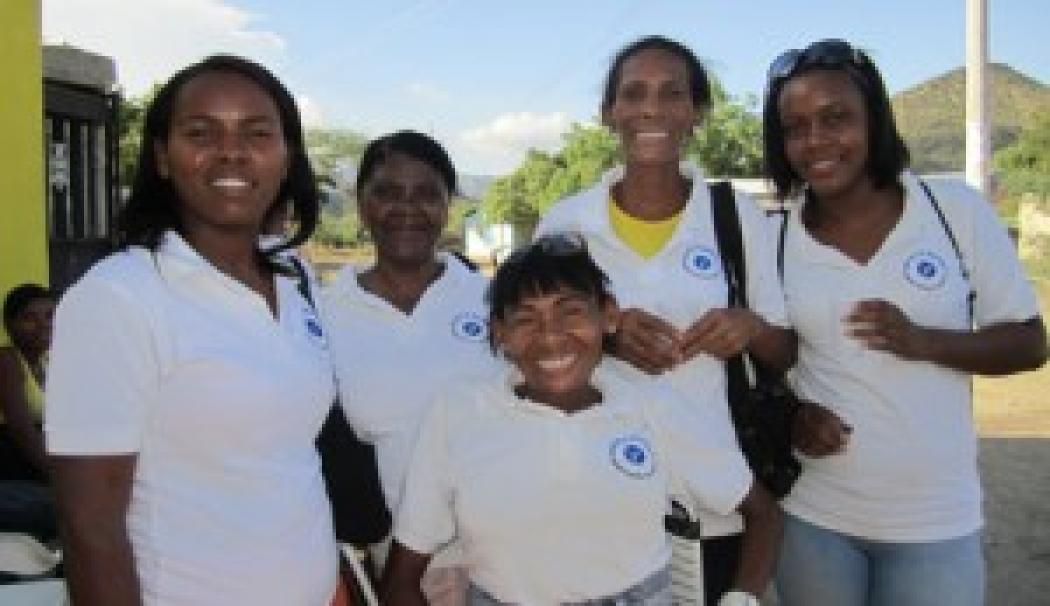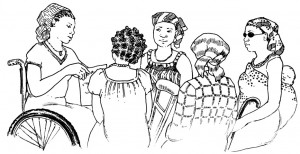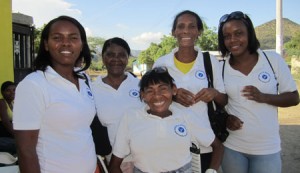What Lizzie Longshaw – and Her Daughters – Teach us about Health Promotion

By Julia Nakad, Hesperian Health Guides
A horrific car accident when she was only 2 caused Lizzie Longshaw of Zimbabwe to have her left arm amputated. As she grew up she realized that she and other women with disabilities in her community were further disadvantaged – they didn’t receive health exams since disability-friendly and accessible clinics were too far away and too expensive for them to visit, and the stigma against women with disabilities was too great at “normal” clinics. Lizzie and a group of women with disabilities began meeting regularly to discuss their health challenges, using a copy of Where Women Have No Doctor to learn more about the issues that most concerned them, including family planning and cancer. After months of working together, they persuaded a Ministry of Health official to open a government-funded mobile clinic to provide free cancer screening and family planning services for women with disabilities.
Lizzie’s group began organizing 20 years ago, before mobile phones, tablets and Internet cafes were available. For Lizzie and her colleagues, access to accurate health information led to dramatic improvements in health outcomes for women with disabilities. The incredible work carried out by Lizzie and the National Council of Disabled Persons of Zimbabwe inspire us to ask how we can increase well-being for all by increasing access to accurate, easy-to-use health information through today’s technology.
In some ways, books and print materials are the still the best: They have no batteries to run out, the only bandwidth they depend on is the reader’s concentration, and they’re easy to pick up and put down as life interrupts. But new technologies offer advantages, too.
On Hesperian’s HealthWiki, a searchable online platform that functions well on slow internet connections, we make freely available the accurate, easy-to-understand health information found in our books. With Hesperian titles available in the HealthWiki in English, Spanish, and an increasing number of other languages such as Arabic, Chinese, Filipino, French, Haitian Kreyol, Khmer, Lao, Portuguese, Vietnamese, and Urdu (and more coming!),this resource helps equip health workers as they build health training and education programs in their communities. And as Lizzie’s experience shows, it also helps them to organize around unmet health needs and advocate for change.
In the past year, the HealthWiki received 2.5 million page views. While information about sanitation and hygiene, healthy food, and “pain in the belly and gut” are popular topics, a striking trend in HealthWiki engagement relates to women’s health information, especially in Spanish. Five of the 10 most viewed pages address pregnancy and reproductive health. Top sending countries to the HealthWiki include Mexico, Colombia, Argentina, Peru, Venezuela and Chile.
Latin America activist-researchers know that adolescents as young as 12 are increasingly engaging in sexual activity, that very high numbers of young women in Latin America report their first sexual experiences as forced or unwanted, and that it is often difficult to access contraceptives and dangerous or impossible to access safe and legal abortions. It stands to reason that the critical need for information about sexual and reproductive health in this region is reflected in HealthWiki use. Among the most-accessed pages in the HealthWiki are “Métodos seguros para realizer un aborto” (Safe abortion methods), “Riesgos y señas de peligro durante un embarazo” (Risks and danger signs during pregnancy), “Violación sexual” (Rape), and “Complicaciones del aborto” (Complications of abortion). Being able to find safe, trustworthy and comprehensive information in an online form responds to the needs of a new generation of tech-savvy yet still marginalized young women. The sheer number of visitors to the HealthWiki’s sexual and reproductive health materials demonstrates that this resource is meeting an urgent need by providing access to information that is otherwise difficult, or dangerous, to obtain.
The HealthWiki also supports the work of frontline health workers. Amelia Brandt, Associate Program Director at Medicines for Humanity, has experience taking the information in the HealthWiki from the computer to the field. In her role overseeing projects in Latin America, she covers 10 projects in 4 countries: Guatemala, Guyana, Haiti and the Dominican Republic. She works with local, faith-based organizations and non-governmental organizations to build the capacity of community and frontline health workers, with the goal of reducing child mortality.
Consulting with her partners on clinical evidence they collect in their communities, Amelia leads a process to determine which areas need training. She then searches for useful materials: “The first place that I go is the HealthWiki,” Amelia said, adding, “I pull out everything relevant that I find (for example, materials about women’s health- adolescent pregnancy is major concern, especially in the Dominican Republic) and send it to our partners in the field for us to discuss and determine what will be most appropriate for use in trainings with our [community health workers]. The material is accessible – it includes health information, different ways to present that information, and activities to accompany it. It’s easy for people with different levels of training experience to use.”
Where Lizzie Longshaw had to labor over a book, a photocopier, and paper, scissors, and tape, new technologies like the HealthWiki make Amelia’s job easier and more conducive to localization.
From promoting contraception options to preventing the spread of Ebola, frontline health workers are the lifeblood of health systems, especially in remote and resource-poor areas. Providing health information to support their programs and facilitate the long-term improvements only they are capable of carrying out is crucial. Health information in all formats – books, flip charts and posters, radio and video, online and via cell phone – in as many languages as possible will make all the difference in the world.


